Hey, Gamers! Have you ever imagined what would happen if the adversaries you faced in video games could learn and adapt to your every move, challenging you in ways you never imagined? Welcome to the era where Artificial Intelligence (AI) isn’t just a gaming component—it’s the game-changer.
In this blog, we’ll explore seven ingenious applications of AI in video games that are reshaping the landscape of interactive entertainment, offering players experiences that are more immersive, dynamic, and captivating than ever before.
From adaptive storytelling to procedurally generated content, get ready to discover the innovative ways AI is revolutionizing the way we play.
What is AI in Gaming?

Artificial intelligence (AI) in gaming offers gamers engaging and entertaining experiences, so the gaming industry increasingly depends heavily on this technology.
In gaming, AI refers to developing techniques and systems that allow game characters to act intelligently, make decisions, learn from their mistakes, and adjust to changing circumstances.

Online gaming is still popular; in 2020, there were 3.1 Billion gamers. It’s estimated that by 2024, there will be another 500 million. And that’s a lot. So, gaming is not a hobby now. It’s more like a serious thing for people out there.
The Impact of AI in Video Games
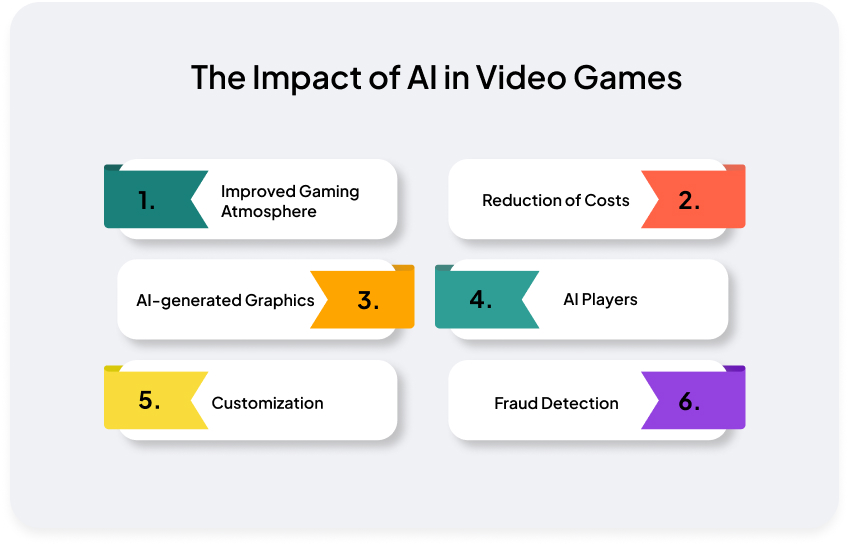 Thanks to AI algorithms, games have become more flexible and adaptable, increasing players’ challenges and boosting engagement levels.
Thanks to AI algorithms, games have become more flexible and adaptable, increasing players’ challenges and boosting engagement levels.
Here are some key impacts of AI in the gaming industry;
1. Improved Gaming Atmosphere
Improving gameplay experiences is one of AI’s main effects in video games. Intelligent and responsive gaming worlds that instantly adjust to player activities are made possible by AI algorithms.
These AI algorithms evaluate how players behave and modify challenging levels in real time, giving players an exciting and fun experience.
2. Reduction of Costs
AI has been important in helping publishers and game developers cut expenses, improve development workflows, and reduce costs by performing repetitive tasks like playtesting, problem-fixing, and content production.
3. AI-Generated Graphics
AI has completely changed how graphics are made for games by allowing designers to quickly and effectively create realistic images. AI in video games has improved texture mapping, character motions, and graphics display.
4. AI Players
In modern games, AI-powered non-player characters (NPCs) have advanced. These artificial intelligence players behave more realistically, adjust to player input, and offer problematic gaming.
5. Customization
Player customization has made personalized gaming experiences possible thanks to AI technologies. AI technologies can reward each player’s specific needs depending on the player’s preferences, behavior patterns, and specific needs.
6. Fraud Detection
In the gaming sector, artificial intelligence detects and prevents fraud. With the growth of digital transactions and online gaming platforms, AI algorithms are used to detect dishonest behavior, fraud, and suspicious activity in games.
Like AI video games, AI storytelling is another discipline where AI has left its mark.
7 Innovative Uses of AI in Video Games
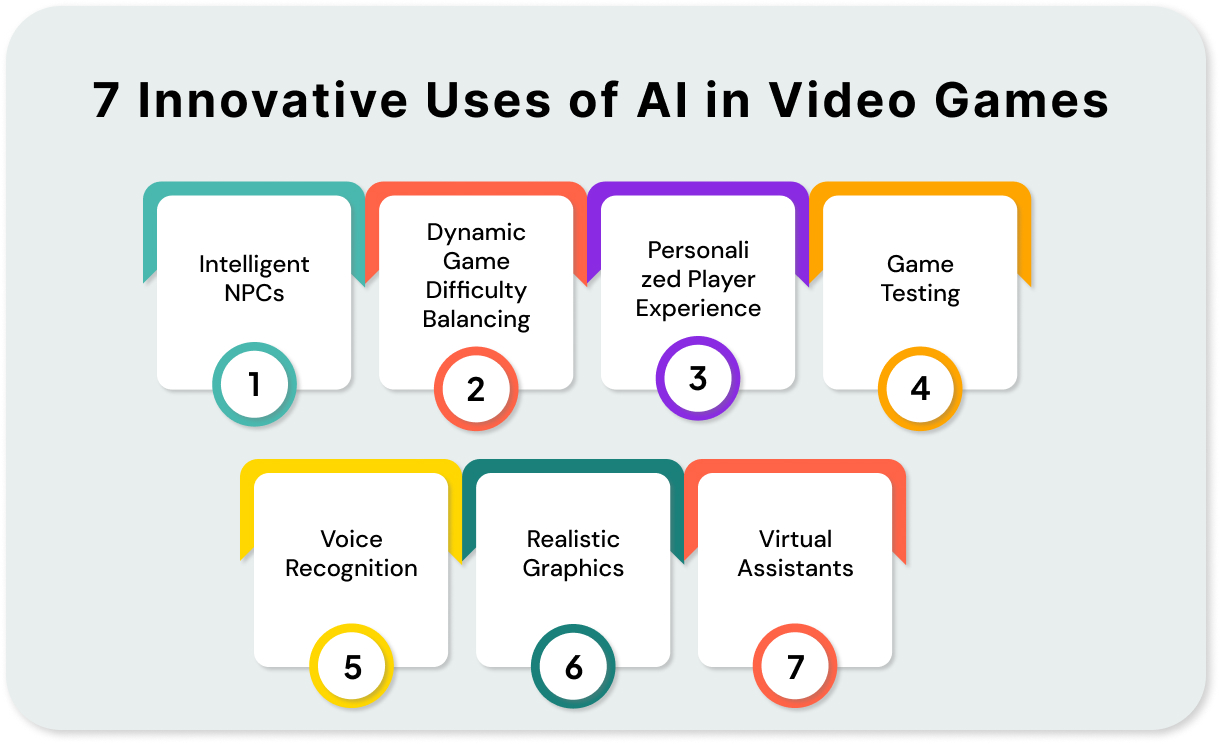
As the gaming industry is all set to rock, more games will be seen in 2024. The gaming industry has transformed because of AI technology. It has allowed developers to produce more dynamic, realistic, and engaging user experiences.
The following list contains seven innovative uses of AI in video games:
1. Non-playable Characters NPCs
Another creative application of AI in video games is intelligent, non-playable characters (NPCs). These non-player characters are more fascinating and realistic because they behave intelligently. They can recall previous incidents, draw lessons from player behavior, and adjust their behavior accordingly.

Games like “Detroit: Become Human,” where the non-player characters (NPCs) have human-like emotions and decision-making abilities, have included this technology.
2. Dynamic Game Difficulty Balancing
An AI method called dynamic game difficulty balancing (DGDB) modifies the game’s difficulty in response to the player’s abilities and performance. This guarantees that the game will always be challenging but accessible to players of all skill levels.
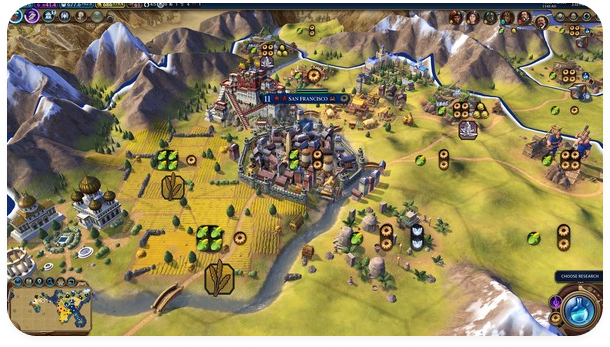
Video games such as “Civilization VI” and “Darkest Dungeon” have successfully utilized this technology.
3. Personalized Player Experience
AI-powered personalization enables video games to customize each player’s experience. AI can provide personalized challenges, recommendations, and material by examining player behaviors, preferences, and skill levels. As a result, playing games becomes more exciting and fun.
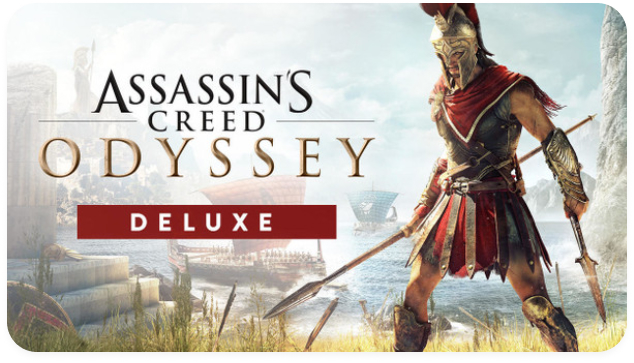
Games like “Assassin’s Creed Odyssey” and “Fortnite” are two examples of this technology in action.
4. Game Testing
AI has wholly transformed the testing and debugging of video games. Artificial Intelligence (AI) can analyze game data, spot problems, and offer remedies using machine learning algorithms.
AI-driven game testing solutions have been used by companies such as “Applause” and “TestFairy.”
5. Voice Recognition
With voice recognition technologies, players can use natural language instructions to engage with games. This improves the availability and engaging experience of gaming for individuals.

Voice recognition technology has been included in games like “Fallout 4” and “Assassin’s Creed Valhalla,” allowing users to interact with the game world and give instructions with their voices.
6. Realistic Graphics
Realistic graphics in video games have changed mainly due to AI. Game developers produce photorealistic backgrounds, characters, and animations thanks to techniques like deep learning and neural networks.
The best realistic graphics in AI video games is seen in. “The last of us Part II”.
7. Virtual Assistants
In video games, virtual assistants offer players interactive guidance and support. They can converse with players, give advice, and explain game mechanics.

AI-powered virtual assistants offer in-game help and support in titles like “Destiny 2” and “Tom Clancy’s The Division.”
Games with AI Characters – What’s That?
In video games, non-player characters (NPCs) designed with a set of rules and algorithms to allow them to make decisions, interact with players, and display intelligent behavior are known as AI characters.
These characters, each with unique skills, characteristics, and personalities, can be enemies, close friends, or viewers.
Examples of AI Characters in Games
- AIs in Real-Time Strategy Games
- AIs in Role-Playing Games
- AIs in First-Person Shooters
- AIs in Simulation Games
Besides AI in video games, AI in entertainment is also changing things.
AI Games For Students
AI is becoming a reality and is used not just for grown-ups. Kids’ AI games are engaging platforms that use artificial intelligence to build an environment where kids can learn and play.
These AI games are beautiful because they serve two purposes: entertainment and educational instruction.
On the one hand, they are educational resources that kids may use to practice new ideas, pick up new skills, and even have fun while learning subjects like language and maths.

However, they also provide kids a fun gaming environment to play, explore, and learn.
Some fun AI games for students are:
1. The Thing Translator

The thing Translator is an interesting game to start with. Your child just needs to take a picture of anything, and this AI game will tell you how to pronounce it in different languages.
2. Freddie Meter

Can you sing like Freddie Mercury?
No, I am not asking that from you. It’s the game that is asking.
This is a fun game you can play with your whole family. All you have to do is sing; this AI game will tell you how good or bad you are at singing.
Sounds fun, Right?
3. Quick Draw
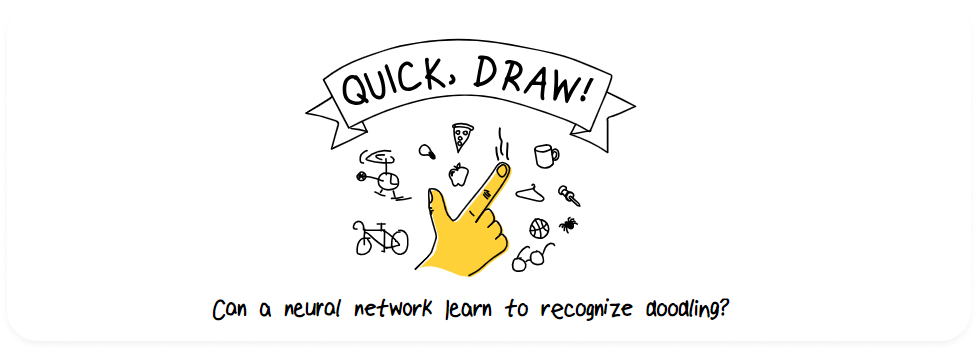
Quick Draw is for everyone who loves drawing. It’s a very interesting game that asks you to draw a thing quickly.
And then, AI will guess whether you draw the right thing.

Try it now and have fun!
Limitations of AI in the Gaming Industry
Several industries, including gaming, have seen tremendous advances in AI. However, AI has several restrictions in the gaming sector that affect multiple aspects of game creation and player experience.
1. Data Privacy
Data privacy is one of the main issues with artificial intelligence in games. The vast data games gather on player interactions, preferences, and behaviors could be abused or corrupted.
2. Offensive Content
AI algorithms that generate conversation or characters for games run the risk of unintentionally creating rude or inappropriate information.
To ensure that AI output fits with moral principles and does not encourage negative stereotypes or discriminatory behavior, developers must closely watch and filter the output produced by the technology.
3. Game Addiction
AI-powered gaming features like customized challenges and reward schemes can make gamers more prone to developing an addiction to video games.
By examining player behavior and preferences, AI can customize the gaming experience to keep players interested longer.
Conclusion
To sum up, AI significantly changes the gaming world and how we play. However, while AI adds much to gaming, it can’t replace that human touch we all love.
But what if you could chat with your favorite AI characters in games?
Wouldn’t that be cool?
Well, now you can with ChatFAI! It’s a platform where your gaming dreams can become a reality.

Try it today!
FAQS
Q. What video game has the best AI?
Games like “Assassin’s Creed Odyssey,” “Fortnite,” “Civilization VI,” and “Darkest Dungeon” are the best examples of AI in games.
Q. Which AI tool is used in gaming?
Skybox is an AI tool used explicitly in games to create visual effects.
Q. What is generative AI in gaming?
Procedural content creation, another name for generative AI, uses AI algorithms to produce new material for video games.
Q. What are the pros and cons of AI in gaming?
AI in video games has changed the gaming industry but has pros and cons.
Pros
- Personalization
- Customize gaming experience
- Time-Saving
- Innovative gaming experience
Cons
- Privacy concern
- Technical Limitation
- Dependence on AI